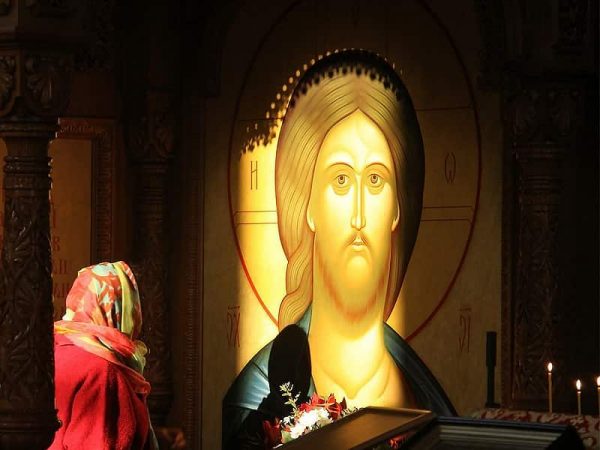
Archpriest Maxim Kozlov
There are several theological visions of the Last Judgment, including a fairly popular opinion: at the Last Judgment you will be asked what kind of person you are, and not how many prayers have been read and how well you have fasted. How will the Last Judgment take place, what will be most important, how will the Lord measure our lives and how will we justify ourselves? Archpriest Maxim Kozlov reflects.
In order to answer what the Last Judgment is, we should first try to answer: what is our salvation? There are two main reductions of the Christian doctrine of salvation, which patristic theology does not agree with and which it is not identical with.
There is one view, perhaps not formulated anywhere as a confessional doctrine, but religiously and psychologically very widespread: salvation is what can be earned. This is something that you can deserve. Or at least you can collect some combination of bonuses, points, good deeds that can be presented, with the words: “Of course, I have sinned, but here is the list, here is the charter with which I have come, please consider it as a mitigating circumstance.”
A similar attitude was common in Western Christianity in the Middle Ages, but it is sometimes found among Orthodox believers in various forms: “I’m a thief, but I’m building a cathedral”, “To pray for forgiveness of a sin, you need to visit 40 liturgies” and so on.
The second reduction introduced by the classical Protestants is that the true believer is already saved, and the rest, in general, doesn’t matter. Because if you fall away from faith, you will show that you did not truly believe. If you seriously sin, you will show that you are not one of the selected.
There is also a modern view, very widespread in the near-religious or para-religious consciousness, that absolutely everyone will be saved.
This is perhaps the prevailing point of view, adjacent to such cliches as that all religions say about the same thing, that God, one way or another, is the same for all religions. In the framework of such a worldview, talking about the Last Judgment is something educational and pedagogical. Indeed, God is kind, he loves everyone, how can He not save someone?
The New Testament is much more polyphonic. In the epistle to the Romans, the apostle Paul writes: “A man is justified by faith without the deeds of the law” (Rom. 3:28). And in the Catholic epistle of the Apostle James we read: “shew me thy faith without thy works, and I will shew thee my faith by my works” (James 2:18). The parable of the Last Judgment speaks of such situations when a person finds salvation in Christ in eternity through the fulfillment of a moral law in relation to the neighbor in earthly life.
The Last Judgment Parable
When the Son of man shall come in his glory, and all the holy angels with him, then shall he sit upon the throne of his glory. And before him shall be gathered all nations: and he shall separate them one from another, as a shepherd divideth his sheep from the goats. And he shall set the sheep on his right hand, but the goats on the left. Then shall the King say unto them on his right hand: Come, ye blessed of my Father, inherit the kingdom prepared for you from the foundation of the world: for I was an hungred, and ye gave me meat; I was thirsty, and ye gave me drink; I was a stranger, and ye took me in; naked, and ye clothed me; I was sick, and ye visited me; I was in prison, and ye came unto me. Then shall the righteous answer him, saying, Lord, when saw we thee an hungred, and fed thee? or thirsty, and gave thee drink? When saw we thee a stranger, and took thee in? or naked, and clothed thee? Or when saw we thee sick, or in prison, and came unto thee? And the King shall answer and say unto them, Verily I say unto you, inasmuch as ye have done it unto one of the least of these my brethren, ye have done it unto me.
Then shall he say also unto them on the left hand: Depart from me, ye cursed, into everlasting fire, prepared for the devil and his angels: for I was an hungred, and ye gave me no meat; I was thirsty, and ye gave me no drink; I was a stranger, and ye took me not in; naked, and ye clothed me not; sick, and in prison, and ye visited me not. Then shall they also answer him, saying: Lord, when saw we thee an hungred, or athirst, or a stranger, or naked, or sick, or in prison, and did not minister unto thee? Then shall he answer them, saying: Verily I say unto you, inasmuch as ye did it not to one of the least of these, ye did it not to me. And these shall go away into everlasting punishment: but the righteous into life eternal” (Matt. 25, 31-46).
For each of us, it is obvious that in relation to salvation, mankind is divided into two unequal parts. There are those who, in their lives on the ways of the Providence of God, met with the Gospel evangelism, responded to it, learned the moral law, not only as a voice of conscience in the soul, but as a word of the Gospel. And from these, to whom more is given, from us, Christians, immeasurably more will be asked. We have no right to say: it’s enough for me to be just a good person, not to violate the criminal code, to respect mom and dad, to be faithful to husband or wife in actions, and not to forget about raising children. None of us has the right to shut ourselves off from the Gospel words: “Be ye therefore perfect, even as your Father which is in heaven is perfect” (Matthew 5:48).
The Christian should understand: I cannot be saved without God. Salvation is a gift that is given to me from Him, and He expects a response from me by faith and life. Faith that is embodied in life. I will be judged in the end by the fact whether the Gospel in my life responded with good fruits or not.
There is another part of humanity: those who, on the ways of the Providence of God here, in historical being, have not come into contact with genuine Christianity. I want to believe that the words of the Apostle Paul from the epistle to the Romans about the Gentiles, who will be judged by the law of conscience, which is in their soul, are applicable to them [1]. Following the parable of the Last Judgment, I believe that they have hope for salvation, but I have no right to not apply the words of the Gospel about a narrow path and narrow gates to myself [2].
Notes:
1. For not the hearers of the law are just before God, but the doers of the law shall be justified. For when the Gentiles, which have not the law, do by nature the things contained in the law, these, having not the law, are a law unto themselves: which shew the work of the law written in their hearts, their conscience also bearing witness, and their thoughts the mean while accusing or else excusing one another (Rom. 2:13 – 15).
2. Enter ye in at the strait gate: for wide is the gate, and broad is the way, that leadeth to destruction, and many there be which go in thereat: because strait is the gate, and narrow is the way, which leadeth unto life, and few there be that find it (Matt. 7:13 – 14).
Translated by Alyona Malafeeva















